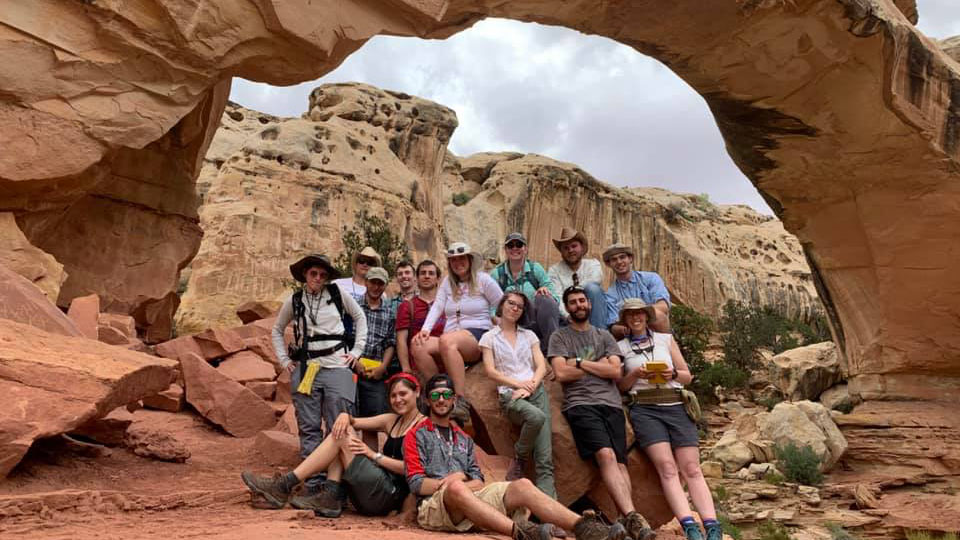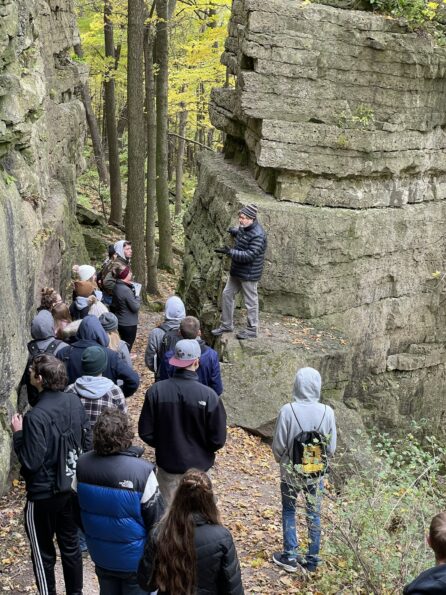
UW Oshkosh’s summer geology field camp is designed to expose students to a wide variety of rock types and geologic settings. Projects are conducted in the Wasatch Mountains, as well as other parts of Utah and Nevada. (Photo courtesy of UW Oshkosh)
The University of Wisconsin Oshkosh’s geology program has a history of turning out highly prepared graduates—the kinds who are sought by employers all over the world.
“Geologists are highly employable because they have been trained in the sciences to perform a wide variety of tasks, such as finding resources, helping clean up environmental messes, mapping geologic hazards, and researching basic earth processes to understand better how the planet works,” said Eric Hiatt, professor and geology department chair.
With a science-based degree, graduates fill many environmental positions. They may be focused on groundwater, surface water, waste disposal, carbon sequestration, earth resources or work in a National Park.
Lauren Bane got her start with a UWO geology degree. A Mukwonago native, Bane performed research, completed an Honor’s thesis based on her research and presented it at a national scientific meeting before graduating in 2016. Bane began graduate studies with a full scholarship that included paid tuition and a salary at the Colorado School of Mines, where she received her master’s degree in 2018.
Hiatt said she is currently working as a project geologist for Chevron directing petroleum exploration of the largest oil field in the Gulf of Mexico and that geologists doing such work typically make about $200,000 a year.
Hiatt said most of UWO’s upper-level geology majors are involved in research projects and get to help teach lab courses.
“These valuable experiences give our students a major advantage when they apply to graduate programs and jobs,” he stressed, adding the median income for geologists in the U.S. is $90,000 with great demand in the job market.
Members of the geology department are regularly contacted by employers, state agencies and graduate programs that are asking for more UWO-trained students, Hiatt said.
 50 years and counting
50 years and counting
The geology department is coming off its 50th anniversary last fall of the University offering one of the first courses focused on the environment—Environment Geology. The course arose from the first Earth Day and coincides with the passage of the Clean Water Act in 1972.
Science of the earth—how it’s composed and structured, climate, environment, life and history—is all part of a broad topic. Geology draws on knowledge of biology, chemistry, mathematics and physics to help understand earth processes.
A popular new four-credit lab science course that studies Geology of the National Park System is among the offerings and is being taught this semester. It fulfills a required laboratory science two-course sequence for bachelor of science, business and education students across the University.
The course emphasizes past and present earth processes that created and shaped the national parks and includes discussions of sustainability and conservation of the earth and its resources. It includes a two-hour, hands-on laboratory in which students study the national parks’ minerals, rocks, fossils and maps.
Earth work
Almost every course involves fieldwork and laboratory experience. A six-week capstone course based in Utah has been taught continuously since 1968. At least one other field course is offered each year, at places including Bermuda, Colorado, the Florida Keys, Hawaii and Yellowstone.
Since 1972, the department has taught environmental geology with students learning about sustainability, climate change and environmental concerns.
“We teach students that the earth resources form the foundation of our society (and sustainability),” Hiatt said. “Everything including materials in your cell phone, computer, desk, house, streets, buildings and even solar panels comes from earth resources. These are fundamentally linked to the evolution of the earth’s environment in the past and are strongly linked to climate change today.”
Written by Laurie Schlosser
Link to original story: https://uwosh.edu/today/112771/uwo-geology-students-thrive-on-field-based-hands-on-learning-strong-demand-for-graduates/
